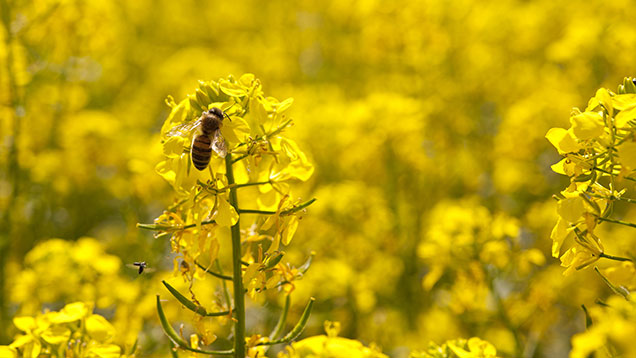Syngenta to support moves for emergency neonic use
 © REX/Image Broker
© REX/Image Broker Agrochemicals giant Syngenta is ready to support farmer-led groups looking to push for the emergency use of banned neonicotinoid seed dressings in oilseed rape.
The European Commission banned these treatments due to their perceived harm to bees, but this led to extensive pest damage in oilseed rape crops last autumn.
Syngenta’s Cruiser and Bayer’s Modesto were the two main neonic casualties of the commission’s action, which led to crops being lost to cabbage stem flea beetle feeding.
“We are ready to support any group which will push for emergency use of neonicotinoids,” Jon Parr, chief operating officer of Syngenta, told Farmers Weekly.
See also: Doubts raised over neonic ban as bee scientists clash
The Swiss-based group, which is the world’s largest agrochemicals company, insists its product is safe, but believes any move to bring it back may be delayed by the UK general election on 7 May.
Mr Parr points out there is unlikely to be a decision until a new UK government is formed after the general election, and then there will only be three months before new drilling starts in August.
The EC imposed its two-year ban in December 2013 on the use of three neonicotinoid insecticides – imidacloprid, clothianidin and thiamethoxam – as seed dressing on bee-attractive crops such as oilseed rape, but there is uncertainty whether these products will return at the end of this year.
Doubts have also been raised over the ban as two scientists have rowed over whether bees were given unrealistic levels of the older neonic imidacloprid in laboratory experiments in order to show adverse effects on bees.
This work at the University of Sussex was a major factor behind the EC ban, while many in the industry say that these type of laboratory studies have not been replicated in the field.
The two agrochemical groups Syngenta and Bayer use newer neonics in Cruiser (thiamethoxam) and Modesto (clothianidin).
Last summer, Syngenta pushed for the emergence use of its Cruiser product backed by the NFU and industry group the Agricultural Industries Confederation, but ran out of time for a decision to be made before autumn drilling.
Some EU countries have gained exemptions to the ban, or derogations, such as Finland which successfully argued it needed neonics for its spring-sown oilseed rape crop.
A survey by the HGCA estimated 2.7% of the oilseed rape in England and Scotland was destroyed last autumn after the neonic ban, but in hotspots such as the M11 corridor the damage was much higher, and Syngenta says there is no easy quick remedy.
“We have nothing in our pipeline to match Cruiser,” adds Mr Parr, who is based at Syngenta’s headquarters at Basel.
Another agrochemical giant is developing a non-neonic dressing based on the active ingredient cyazapyr, but it is unclear when it may be launched and its efficacy.
Syngenta’s Mr Parr is promising UK farmers a number of new fungicides and cereal varieties from its pipeline which will hit the UK market in the next two to three years.
“We are feeling good about what we are about to bring the UK farmer, and much better than the last few years,” adds Mr Parr.
After some lean years since the launch of its SDHI-azole cereal fungicide Seguris in spring 2012, Mr Parr says two new SDHIs and new hybrid barley varieties are in the pipeline.
The Swiss group hopes to launch its SDHI product Elatus (solatenol) in the UK in the spring of 2017 to control septoria and rusts in cereals, and Mr Parr describes this SDHI as “best in class”.
The product was launched in Brazil last year for use against soya bean rust, and marked Syngenta’s largest ever product launch in the group’s history with sales of over $300m in its first season.
The second SDHI product Vibrance (sedaxane) is set to be launched in the autumn of 2017 as a cereal seed treatment aimed at boosting germination vigour and leading to good establishment.
In addition, a new generation of high-yielding hybrid winter barleys is set to be available this autumn in Scotland, seven years after the group launched its hybrid variety Volume.
“Our pipeline is stronger than it has been in recent times, particularly for Europe and particularly for the UK,” he adds.

